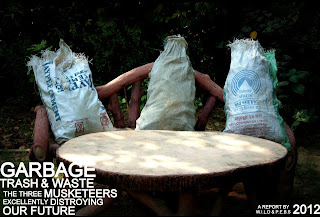“We generate our
own Environment. We get what we deserve. How can we resent a life that we have created ourselves?
Who is to blame, who is to credit, but us? Who can bring about a change, but
us?”
With this aim in mind, the team of W.I.L.D
initiated a Lucknow
Zoological Garden Clean Up on World Environment Day.
Sona (female white tiger)
Lucknow Zoological Garden, located in
the heart of the capital city of Uttar Pradesh is one of the most beautiful
zoological gardens of India. The Zoo is being managed as a trust by the Zoo
Advisory Committee. It initiated the White Tiger Conservation Project few
years back and today with its efforts the world has managed to save the
species. It has lately proposed to start a ‘cell-bank’ or a ‘frozen zoo’
for the conservation of endangered species though the idea is still under
consideration.
The Zoo is home to a large variety of mammals, birds, and reptiles. It receives around 7,00,000-9,00,000 visitors annually who visit the Zoo to appreciate the fauna so beautifully created by God but sadly they are the ones destroying it. The Zoo is facing certain issues which it has been unable to overcome as they are in the hands of visitors. They have become a major concern for the zoo staff. people throwing stones at creatures, breaking the fences and making their way as close to the animals as possible, throwing eatables to the animals, throwing tin cans, plastic bottles etc. in the cages of animals and teasing them are offences which are punishable by law. Several boards reading, “FINE OF RS.2000/- IF CAUGHT TEASING THE ANIMAL” have been put up by the zoo authorities all over the campus, however visitors are fearless of punishment. The Zoo Administration has put a ban on any sort of plastic products inside the campus, but the visitors manage to take in plastic bottles, packets of chips and other non-biodegradable material. The zoo has been provided with stalls inside the campus which sell products in plastic and non-biodegradable pouches and containers. However, this facility has been provided for the convenience of visitors and its the visitors responsibility not to misuse it by littering the place.
The overall analysis of this issue proves that
these problems can only be solved by individual efforts of visitors.
To overcome these problems our first step towards cleaning up the Zoo was warmly welcomed by the Zoo staff and the people visiting the Zoo. We started from cleaning up the pavements, the roads that ran across the Zoo, the gardens and the small canteens. Slowly and steadily visitors also stepped forward and helped our team in collecting the litter nearby by handing over the used plastic plates, empty tin cans etc. to us instead of throwing them anywhere else in the campus. In a few hours time we were able to fill three garbage bags and two dustbins with both biodegradable and non-biodegradable waste.
To overcome these problems our first step towards cleaning up the Zoo was warmly welcomed by the Zoo staff and the people visiting the Zoo. We started from cleaning up the pavements, the roads that ran across the Zoo, the gardens and the small canteens. Slowly and steadily visitors also stepped forward and helped our team in collecting the litter nearby by handing over the used plastic plates, empty tin cans etc. to us instead of throwing them anywhere else in the campus. In a few hours time we were able to fill three garbage bags and two dustbins with both biodegradable and non-biodegradable waste.
Its time to change now, time to
hear the ignored groans of these innocent creatures. The Zoo staff alone cannot
handle or be held responsible for everything. It is our city and it is our duty
to uplift it from the present day condition. We need to join hands with our Zoo
Staff and make our Zoo a Better and a Cleaner place.
Every Zoological Garden has the
following phrase printed on a mirror at its gate: “WORLD’ S MOST DESTRUCTIVE CREATURE”.
Let us not prove this statement right. A little effort for a Greener and
Cleaner tomorrow is not much to ask for!
“What’s the use of a Fine House
if you do not have a Tolerable Planet to put it on?’’
So DO YOUR BIT TO NURTURE THE
WILD, COME SUPPORT W.I.L.D.
-Abhinav Kumar Saxena
-Abhinav Kumar Saxena
( President/Founder
W.I.L.D)
-Pratishtha Raj
( Member)




